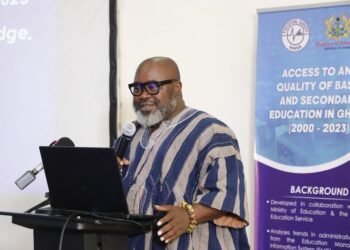Dr. Samuel Nkumbaan, President of the University of Ghana Branch of UTAG, has disclosed some of the issues brought about by Ghana’s $3 billion International Monetary Fund (IMF) agreement.
Commenting on the topic “Is the Salaries/Wages of the Ghanaian Worker Sustainable Today?, he underlined that the deal will stymie workers’ aspirations for greater wages or incomes.
The IMF program stresses the importance of striking a careful balance between burden sharing, productivity, and the government’s ability to pay, with a particular emphasis on calibrating public sector wages.
Ghana, with an estimated nominal GDP of $79.5 billion (GHS 873 billion), confronts the daunting job of cutting public sector remuneration by $397 million. The government’s desire to achieve this reduction demonstrates its dedication to enacting fiscal reforms and realigning public sector salaries.
However, Dr. Nkumbaan contends that the proposed salary cuts will have a substantial impact on workers in an economy already beset by economic issues.
According to him, Ghanaian employees are locked in a hand-to-mouth existence, dealing with high inflation and rising living costs.
“The IMF deal comes with challenges for workers such as the recent objective of the government wanting cut down wages/salaries of workers by 0.5% of GDP which will by the way have negative implications on workers. And with the current high inflation and other economic challenges, workers find themselves in a hand-to-mouth economy.”
Dr. Samuel Nkumbaan
Amidst the economic hardships, labor unions have become more vociferous in their demand for higher base pay. Dr. Nkumbaan emphasized the need of the government listening to these demands, especially given the current economic situation.
Workers’ hopes for higher salaries, he said, are spurred by rising inflationary pressures and the rising cost of living, both of which worsen the strain on their finances.
Labor Unions Encouraged To Campaign For Better Wages For Their Workforce Members
Also commenting on the topic Is the Salaries/Wages of the Ghanaian Worker Sustainable Today?, Dr. Priscilla Twumasi Baffour, Senior Lecturer at the University of Ghana’s Department of Economics, has voiced concerns about the sustainability of employees’ earnings or salaries in the country.

Dr. Baffour raised awareness to the difficult economic conditions that jeopardize Ghanaian employees’ financial well-being. Her main worry was the erosion of the real value of wages and salaries as a result of prolonged inflation.
Dr. Baffour illustrated that the combination of economic issues and low pay exacerbates employees’ suffering, pushing them deeper into debt and hindering their capacity to meet even basic demands.
Dr. Baffour underscored the urgent need for labor unions to take a more assertive role in lobbying for improved economic management in order to solve the chronic issue of inadequate wages and salaries.
She encouraged labor unions to aggressively interact with lawmakers to effectively communicate workers’ concerns and interests.
Labor unions, she said, can exercise influence and assist design policies that defend workers’ welfare, ensuring they are not unfairly burdened by economic downturns or crises, by developing stronger relationships and engaging in crucial economic discussions and decision-making processes.
Read also: Finance Minister Assures Foreign Investors Of Gov’t’s Commitment To A Rapid Economic Recovery




















